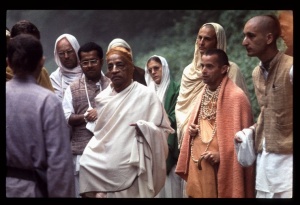SB 7.10.50

A.C. Bhaktivedanta Swami Prabhupada
TEXT 50
- na yasya sākṣād bhava-padmajādibhī
- rūpaṁ dhiyā vastutayopavarṇitam
- maunena bhaktyopaśamena pūjitaḥ
- prasīdatām eṣa sa sātvatāṁ patiḥ
SYNONYMS
na—not; yasya—of whom; sākṣāt—directly; bhava—Lord Śiva; padma-ja—Lord Brahmā (born from the lotus); ādibhiḥ—by them and others also; rūpam—the form; dhiyā—even by meditation; vastutayā—fundamentally; upavarṇitam—described and perceived; maunena—by samādhi, deep meditation; bhaktyā—by devotional service; upaśamena—by renunciation; pūjitaḥ—worshiped; prasīdatām—may He be pleased; eṣaḥ—this; saḥ—He; sātvatām—of the great devotees; patiḥ—the master.
TRANSLATION
Exalted persons like Lord Śiva and Lord Brahmā could not properly describe the truth of the Supreme Personality of Godhead, Kṛṣṇa. May the Lord, who is always worshiped as the protector of all devotees by great saints who observe vows of silence, meditation, devotional service and renunciation, be pleased with us.
PURPORT
The Absolute Truth is sought by different persons in different ways, yet He remains inconceivable. Nonetheless, devotees like the Pāṇḍavas, the gopīs, the cowherd boys, Mother Yaśodā, Nanda Mahārāja and all the inhabitants of Vṛndāvana do not need to practice conventional processes of meditation to attain the Supreme Personality of Godhead, for He remains with them through thick and thin. Therefore a saint like Nārada, understanding the difference between transcendentalists and pure devotees, always prays that the Lord will be pleased with him.